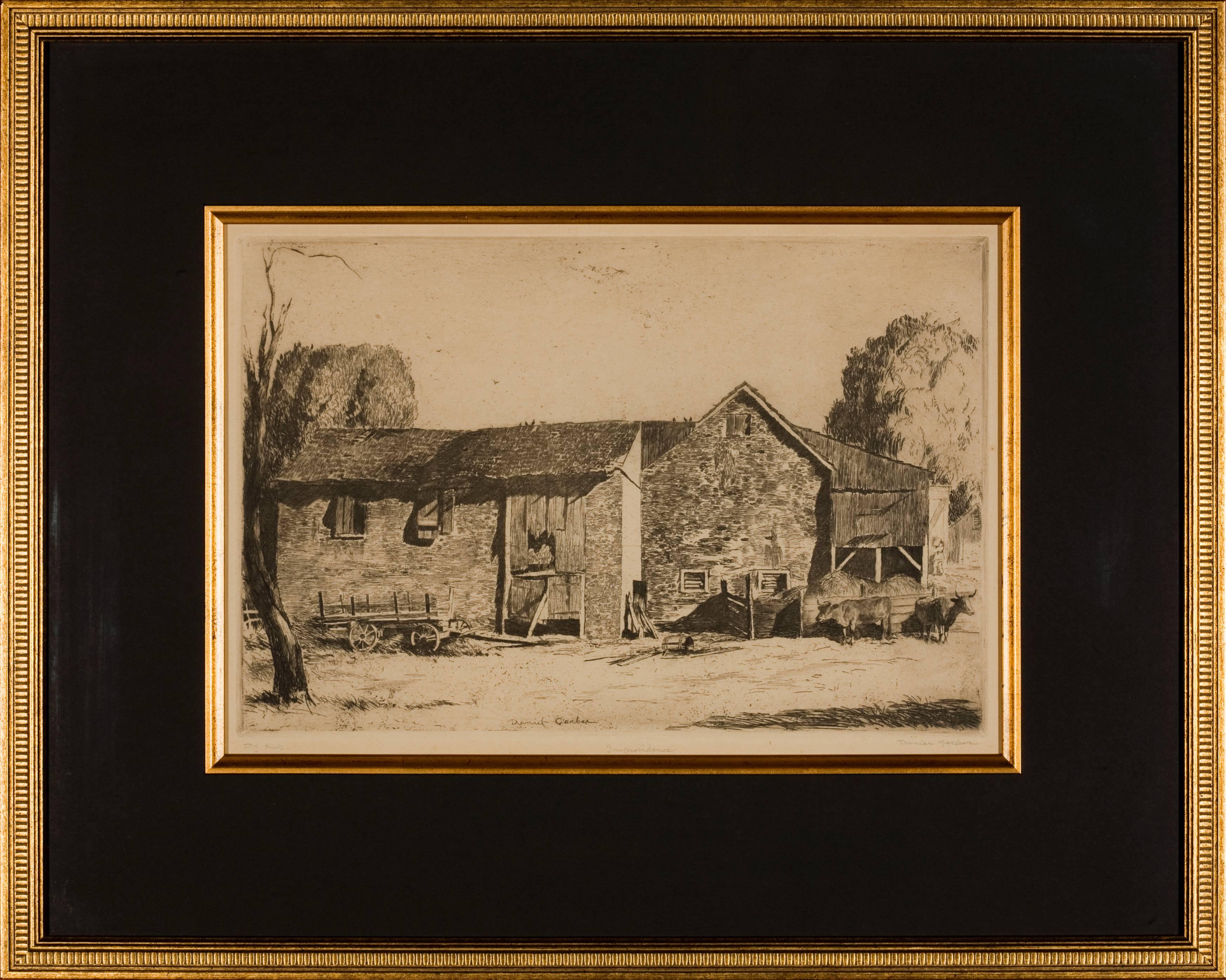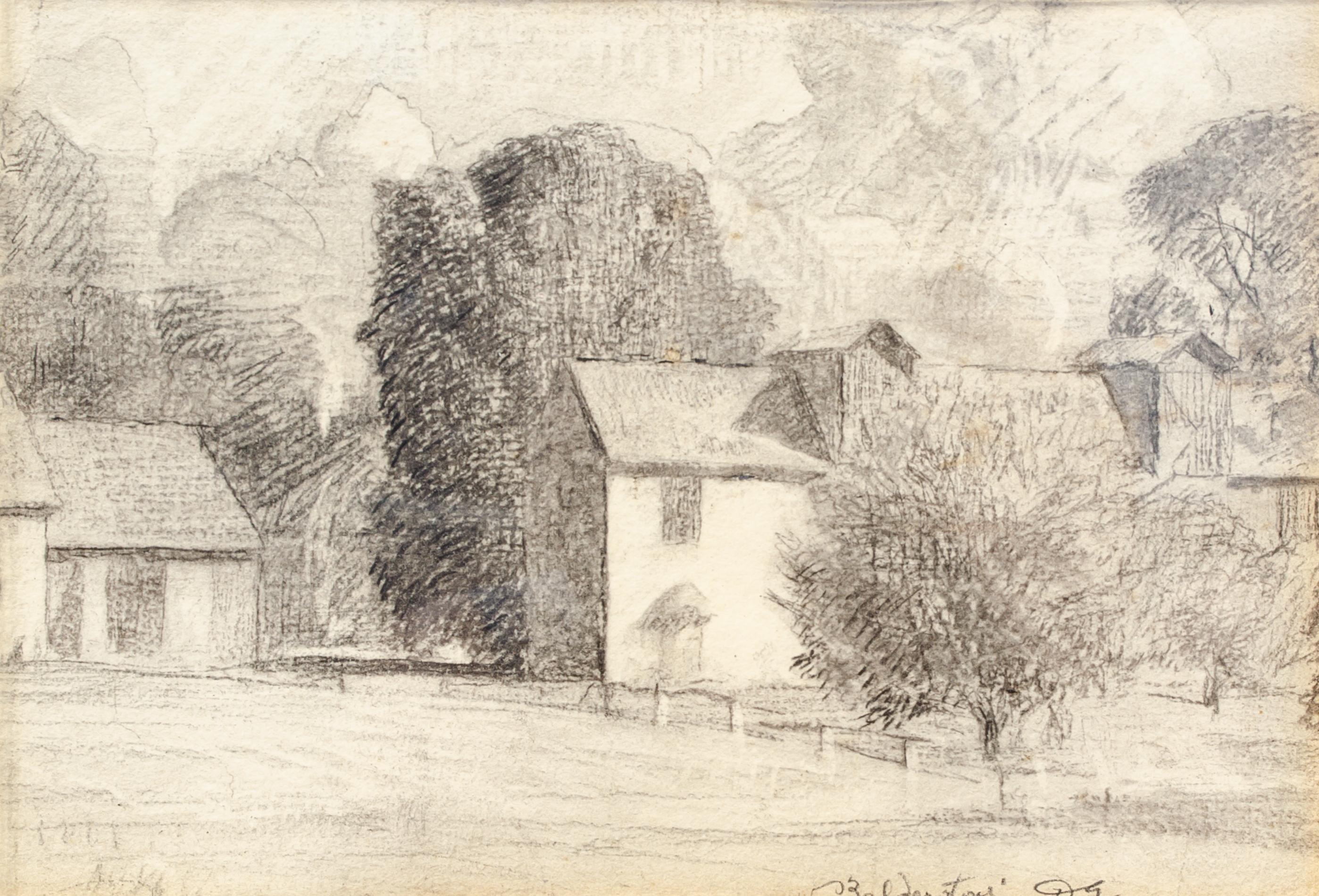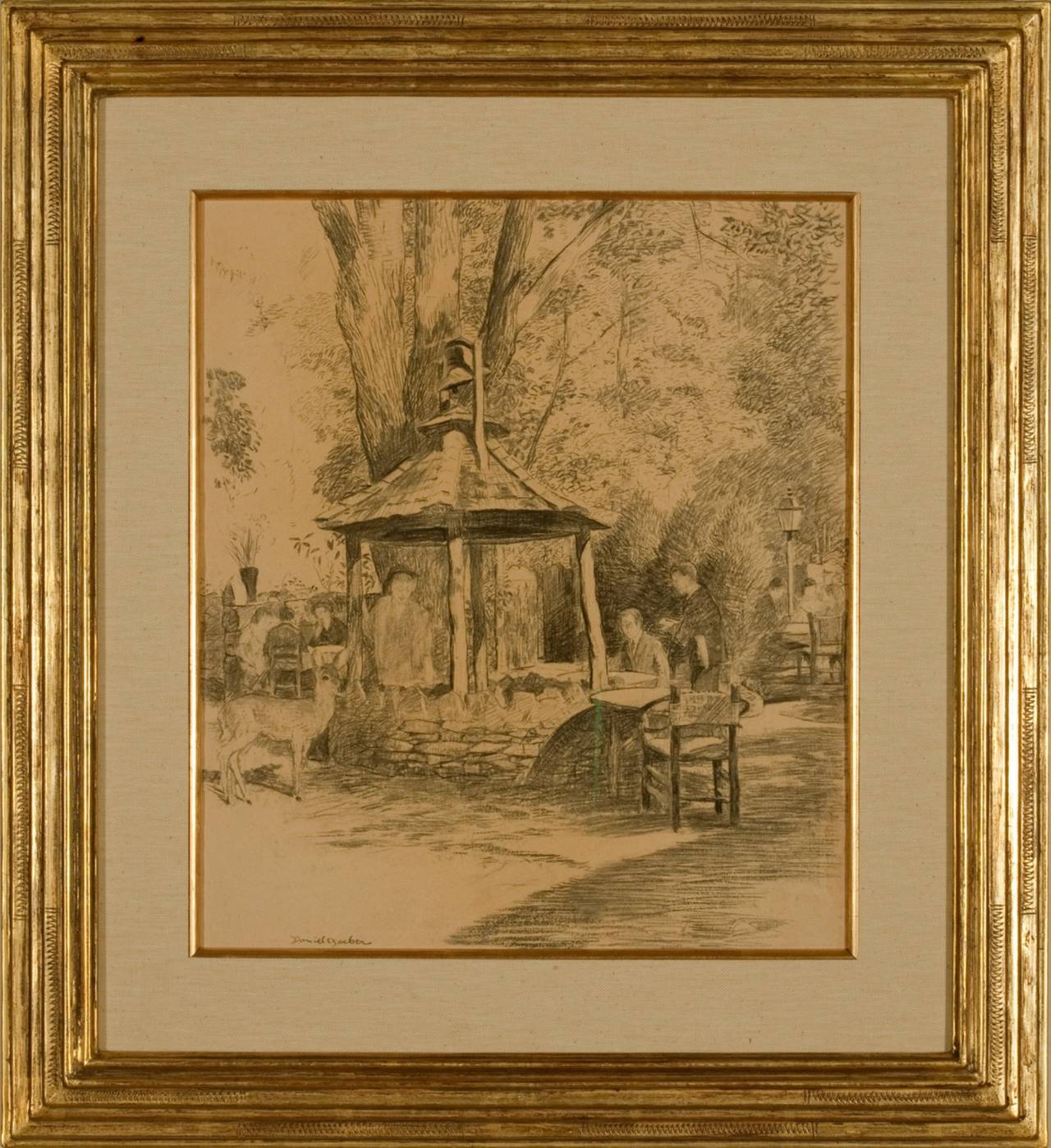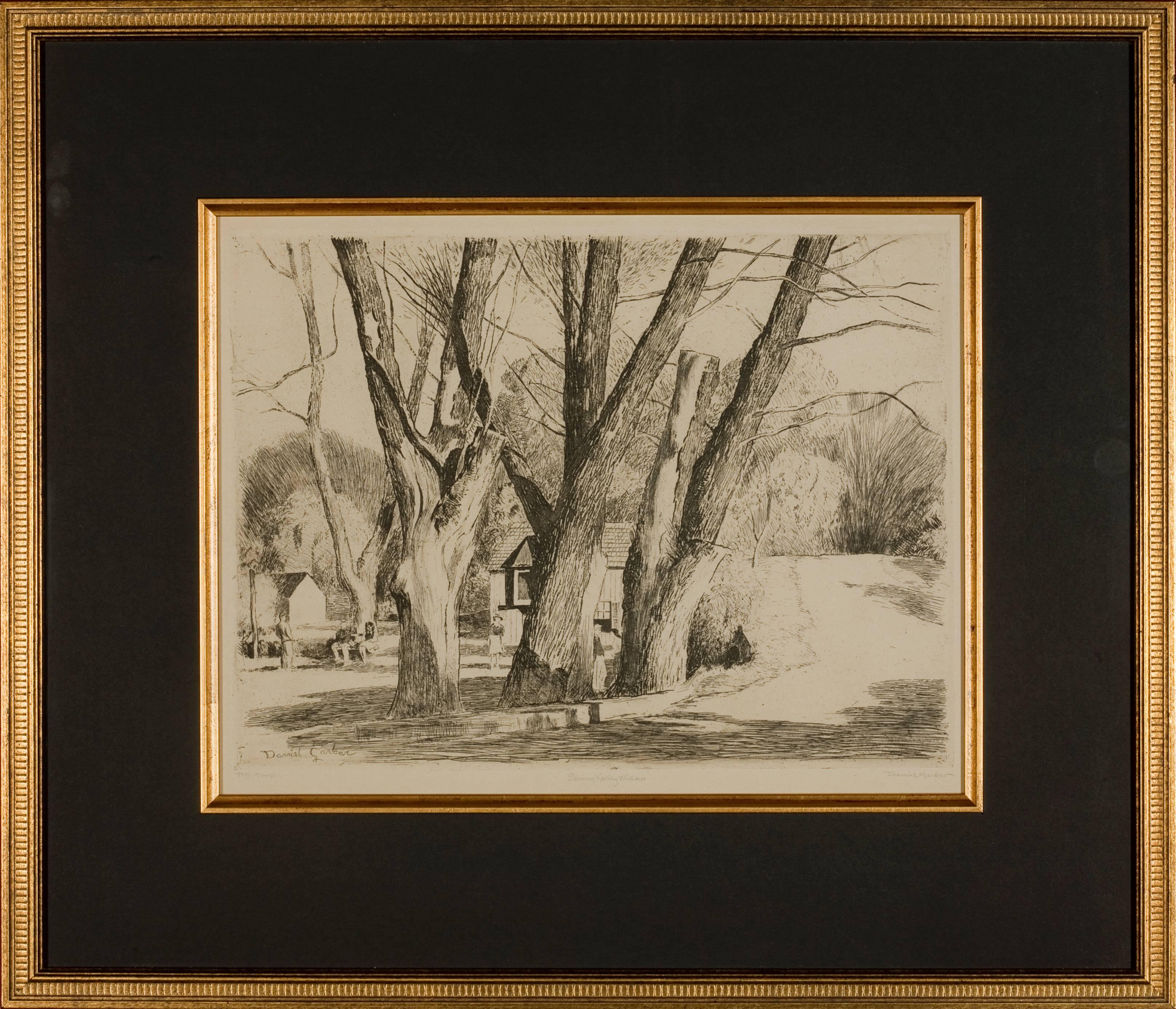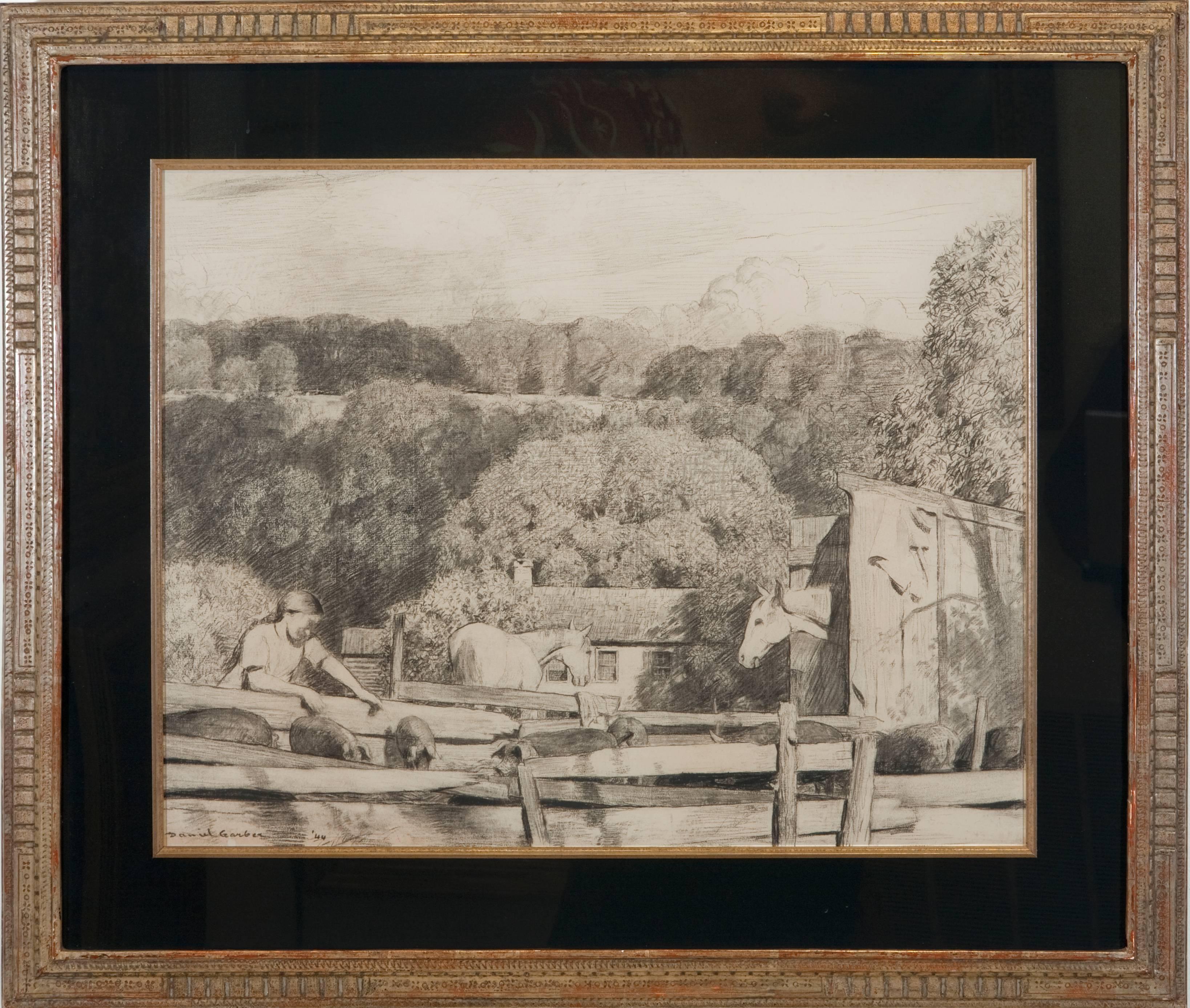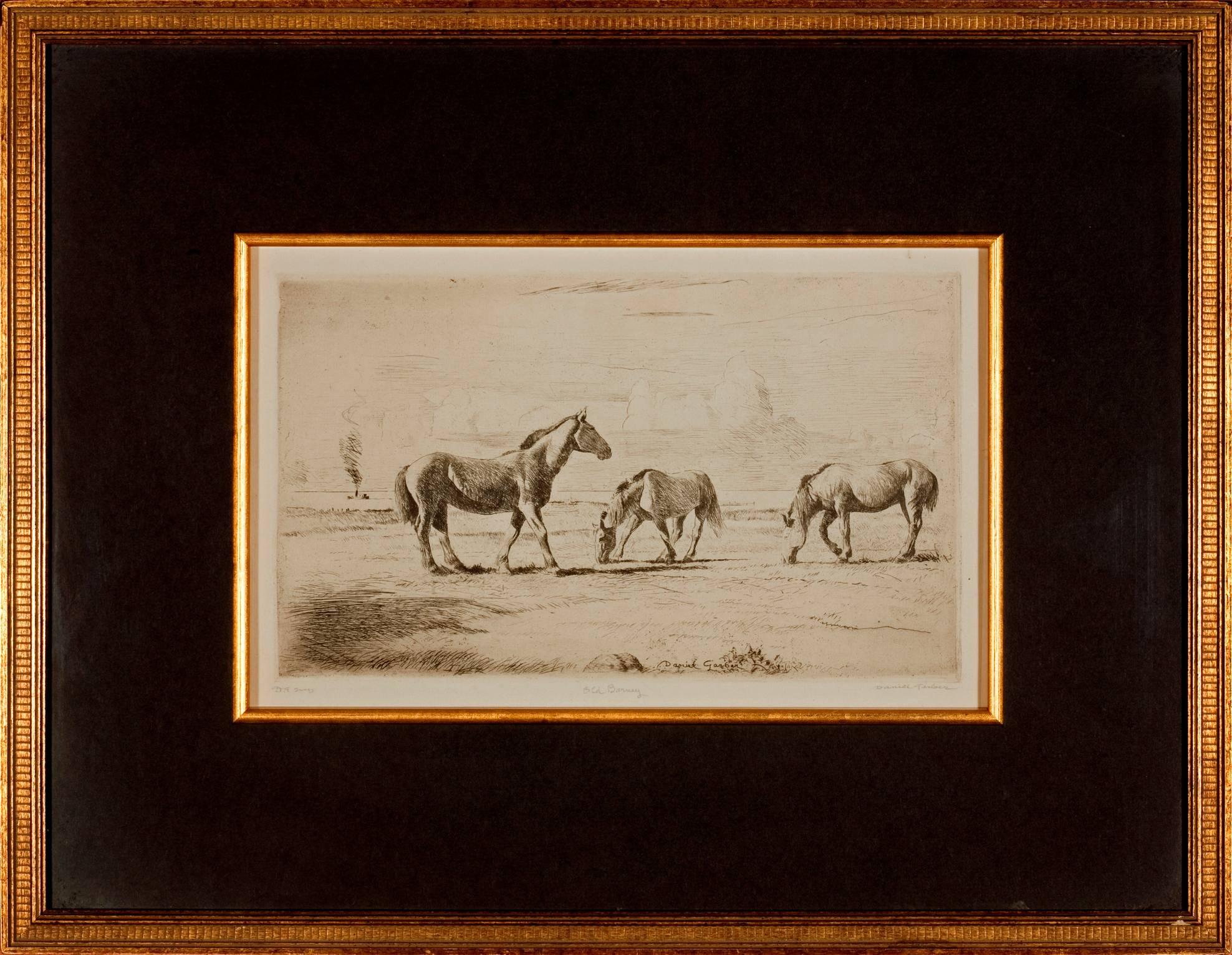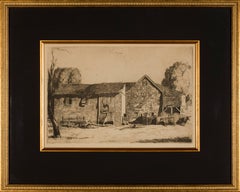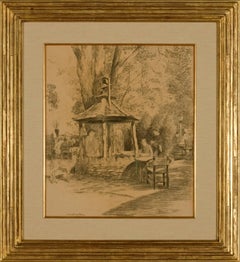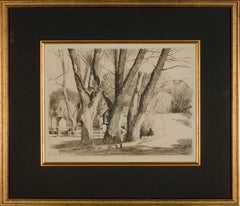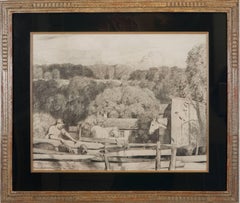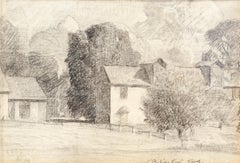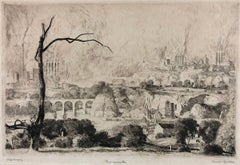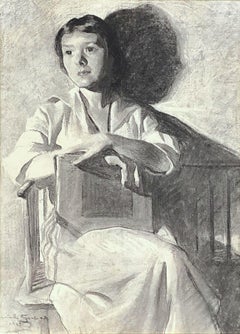Want more images or videos?
Request additional images or videos from the seller
1 of 3
Daniel Garber"Birmingham Meeting House"1935
1935
$4,950
£3,681.96
€4,310.85
CA$6,906.93
A$7,729.05
CHF 4,035.75
MX$95,020.62
NOK 50,915.60
SEK 47,911.32
DKK 32,162.26
Shipping
Retrieving quote...The 1stDibs Promise:
Authenticity Guarantee,
Money-Back Guarantee,
24-Hour Cancellation
About the Item
Jim’s of Lambertville Fine Art Gallery is proud to present this piece by Daniel Garber (1880 - 1958).
One of the two most important and, so far, the most valuable of the New Hope School Painters, Daniel Garber was born on April 11, 1880, in North Manchester, Indiana. At the age of seventeen, he studied at the Art Academy of Cincinnati with Vincent Nowottny. Moving to Philadelphia in 1899, he first attended classes at the "Darby School," near Fort Washington; a summer school run by Academy instructors Anshutz and Breckenridge. Later that year, he enrolled at the Pennsylvania Academy of the Fine Arts. His instructors at the Academy included Thomas Anshutz, William Merritt Chase and Cecilia Beaux. There Garber met fellow artist Mary Franklin while she was posing as a model for the portrait class of Hugh Breckenridge. After a two year courtship, Garber married Mary Franklin on June 21, 1901.
In May 1905, Garber was awarded the William Emlen Cresson Scholarship from the Pennsylvania Academy, which enabled him to spend two years for independent studies in England, Italy and France. He painted frequently while in Europe, creating a powerful body of colorful impressionist landscapes depicting various rural villages and farms scenes; exhibiting several of these works in the Paris Salon.
Upon his return, Garber began to teach Life and Antique Drawing classes at the Philadelphia School of Design for Women in 1907. In the summer of that same year, Garber and family settled in Lumbertville, Pennsylvania, a small town just north of New Hope. Their new home would come to be known as the "Cuttalossa," named after the creek which occupied part of the land. The family would divide the year, living six months in Philadelphia at the Green Street townhouse while he taught, and the rest of the time in Lambertville. Soon Garber’s career would take off as he began to receive a multitude of prestigious awards for his masterful Pennsylvania landscapes. During the fall of 1909, he was offered a position to teach at the Pennsylvania Academy as an assistant to Thomas Anshutz. Garber became an important instructor at the Academy, where he taught for forty-one years.
Daniel Garber painted masterful landscapes depicting the Pennsylvania and New Jersey countryside surrounding New Hope. Unlike his contemporary, Edward Redfield, Garber painted with a delicate technique using a thin application of paint. His paintings are filled with color and light projecting a feeling of endless depth. Although Like Redfield, Garber painted large exhibition size canvases with the intent of winning medals, and was extremely successful doing so, he was also very adept at painting small gem like paintings. He was also a fine draftsman creating a relatively large body of works on paper, mostly in charcoal, and a rare few works in pastel. Another of Garber’s many talents was etching. He created a series of approximately fifty different scenes, most of which are run in editions of fifty or less etchings per plate.
Throughout his distinguished career, Daniel Garber was awarded some of the highest honors bestowed upon an American artist. Some of his accolades include the First Hallgarten Prize from the National Academy in 1909, the Bronze Medal at the International Exposition in Buenos Aires in 1910, the Walter Lippincott Prize from the Pennsylvania Academy and the Potter Gold Medal at the Art Institute of Chicago in 1911, the Second Clark Prize and the Silver Medal from the Corcoran Gallery of Art for “Wilderness” in 1912, the Gold Medal from the Panama-Pacific Exposition in San Francisco of 1915, the Second Altman Prize in1915, the Shaw prize in 1916, the First Altman Prize in 1917, the Edward Stotesbury Prize in1918, the Temple Gold Medal, in 1919, the First William A. Clark Prize in 1921, the Gold Medal from the Philadelphia Art Club in 1923, the Carnegie Institute Bronze Medal in 1924, the Gold Medal of Honor in 1929, the Jenny Sesnan Gold Medal in 1937, the Pennell Medal in 1942, and the Pennsylvania Academy Fellowship Award in1947 among many others.
Daniel Garber and Edward Redfield are known by most art enthusiasts as the two leading figures associated with the New Hope Art Colony. This is a correct assessment, but in the broader scope, as key figures in twentieth century American Art, their importance is equally paramount. As this group, once considered regional, secures it’s place in history, painters like Garber and Redfield are destined to be considered the true American Masters by the international art world.
Garber's work is included in nearly thirty museum collections nationally and this number is growing. He is also the first of the "New Hope School" painters to exceed the million dollar mark at auction which occurred in 2003.
- Creator:Daniel Garber (1880-1958, American)
- Creation Year:1935
- Dimensions:Height: 6.75 in (17.15 cm)Width: 9 in (22.86 cm)
- Medium:
- Movement & Style:
- Period:
- Condition:
- Gallery Location:Lambertville, NJ
- Reference Number:Seller: LAM00321stDibs: LU374945223
About the Seller
5.0
Vetted Professional Seller
Every seller passes strict standards for authenticity and reliability
Established in 1997
1stDibs seller since 2014
38 sales on 1stDibs
Typical response time: 23 hours
- ShippingRetrieving quote...Shipping from: Lambertville, NJ
- Return Policy
Authenticity Guarantee
In the unlikely event there’s an issue with an item’s authenticity, contact us within 1 year for a full refund. DetailsMoney-Back Guarantee
If your item is not as described, is damaged in transit, or does not arrive, contact us within 7 days for a full refund. Details24-Hour Cancellation
You have a 24-hour grace period in which to reconsider your purchase, with no questions asked.Vetted Professional Sellers
Our world-class sellers must adhere to strict standards for service and quality, maintaining the integrity of our listings.Price-Match Guarantee
If you find that a seller listed the same item for a lower price elsewhere, we’ll match it.Trusted Global Delivery
Our best-in-class carrier network provides specialized shipping options worldwide, including custom delivery.More From This Seller
View All"Improvidence"
By Daniel Garber
Located in Lambertville, NJ
Jim’s of Lambertville Fine Art Gallery is proud to present this piece by Daniel Garber (1880 - 1958).
One of the two most important and, so far, the most valuable of the New Hope Sc...
Category
1920s American Impressionist Landscape Prints
Materials
Etching
"Lunch at the Stockton Inn"
By Daniel Garber
Located in Lambertville, NJ
Jim’s of Lambertville is proud to offer this artwork.
Signed lower left. Pencil drawing.
Complemented by a hand carved and gilt frame.
Daniel Garber (1880-1958)
...
Category
20th Century American Impressionist Landscape Drawings and Watercolors
Materials
Pencil, Paper
"Spring Valley Willows"
By Daniel Garber
Located in Lambertville, NJ
Jim’s of Lambertville Fine Art Gallery is proud to present this piece by Daniel Garber (1880 - 1958).
One of the two most important and, so far, the most valuable of the New Hope School Painters, Daniel Garber was born on April 11, 1880, in North Manchester, Indiana. At the age of seventeen, he studied at the Art Academy of Cincinnati with Vincent Nowottny. Moving to Philadelphia in 1899, he first attended classes at the "Darby School," near Fort Washington; a summer school run by Academy instructors Anshutz and Breckenridge. Later that year, he enrolled at the Pennsylvania Academy of the Fine Arts. His instructors at the Academy included Thomas Anshutz, William Merritt Chase and Cecilia Beaux. There Garber met fellow artist Mary Franklin while she was posing as a model for the portrait class of Hugh Breckenridge. After a two year courtship, Garber married Mary Franklin on June 21, 1901.
In May 1905, Garber was awarded the William Emlen Cresson Scholarship from the Pennsylvania Academy, which enabled him to spend two years for independent studies in England, Italy and France. He painted frequently while in Europe, creating a powerful body of colorful impressionist landscapes depicting various rural villages and farms scenes; exhibiting several of these works in the Paris Salon.
Upon his return, Garber began to teach Life and Antique Drawing classes at the Philadelphia School of Design for Women in 1907. In the summer of that same year, Garber and family settled in Lumbertville, Pennsylvania, a small town just north of New Hope. Their new home would come to be known as the "Cuttalossa," named after the creek which occupied part of the land. The family would divide the year, living six months in Philadelphia at the Green Street townhouse while he taught, and the rest of the time in Lambertville. Soon Garber’s career would take off as he began to receive a multitude of prestigious awards for his masterful Pennsylvania landscapes. During the fall of 1909, he was offered a position to teach at the Pennsylvania Academy as an assistant to Thomas Anshutz. Garber became an important instructor at the Academy, where he taught for forty-one years.
Daniel Garber painted masterful landscapes depicting the Pennsylvania and New Jersey countryside surrounding New Hope. Unlike his contemporary, Edward Redfield, Garber painted with a delicate technique using a thin application of paint. His paintings are filled with color and light projecting a feeling of endless depth. Although Like Redfield, Garber painted large exhibition size canvases with the intent of winning medals, and was extremely successful doing so, he was also very adept at painting small gem like paintings. He was also a fine draftsman creating a relatively large body of works on paper, mostly in charcoal, and a rare few works in pastel. Another of Garber’s many talents was etching. He created a series of approximately fifty different scenes, most of which are run in editions of fifty or less etchings per plate.
Throughout his distinguished career, Daniel Garber was awarded some of the highest honors bestowed upon an American artist. Some of his accolades include the First Hallgarten Prize from the National Academy in 1909, the Bronze Medal at the International Exposition in Buenos Aires in 1910, the Walter Lippincott Prize from the Pennsylvania Academy and the Potter Gold Medal at the Art Institute of Chicago in 1911, the Second Clark Prize and the Silver Medal from the Corcoran Gallery of Art for “Wilderness” in 1912, the Gold Medal from the Panama-Pacific Exposition in San Francisco of 1915, the Second Altman Prize in1915, the Shaw prize in 1916, the First Altman Prize in 1917, the Edward Stotesbury Prize in1918, the Temple Gold Medal, in 1919, the First William A...
Category
1940s American Impressionist Landscape Prints
Materials
Etching
"Pigs"
By Daniel Garber
Located in Lambertville, NJ
Jim’s of Lambertville Fine Art Gallery is proud to present this piece by Daniel Garber (1880 - 1958).
One of the two most important and, so far, the most valuable of the New Hope Sc...
Category
1940s American Impressionist Landscape Drawings and Watercolors
Materials
Charcoal
$49,375
"Old Barney"
By Daniel Garber
Located in Lambertville, NJ
Jim’s of Lambertville Fine Art Gallery is proud to present this piece by Daniel Garber (1880 - 1958).
One of the two most important and, so far, the most valuable of the New Hope Sc...
Category
Mid-20th Century American Impressionist Landscape Prints
Materials
Etching
"Fields in Jersey"
By Daniel Garber
Located in Lambertville, NJ
Jim’s of Lambertville Fine Art Gallery is proud to present this piece by Daniel Garber (1880 - 1958).
One of the two most important and, so far, the most valuable of the New Hope Sc...
Category
Early 1900s American Impressionist Landscape Paintings
Materials
Canvas, Oil
You May Also Like
Daniel Garber Original Drawing, from Artist's Estate
By Daniel Garber
Located in New York, NY
Daniel Garber (American, 1880-1958)
Balderstons, c. Early 20th Century
Pencil on paper
7 x 9 in.
Framed: 12 x 4 x 1/2 in.
Titled and initialed lower right: Balderstons, D.G.
Proven...
Category
Early 20th Century American Impressionist Figurative Drawings and Waterc...
Materials
Paper, Pencil
Harmonville
By Daniel Garber
Located in Missouri, MO
DANIEL GARBER
"Harmonville, Pennsylvania" c. 1925
Etching printed in black ink on wove paper.
7 7/8 x 11 3/4 inches, full margins.
Signed, titled and inscribed "DG imp" in pencil, ...
Category
1920s American Impressionist Landscape Prints
Materials
Etching
Price Upon Request
Elsa
By Daniel Garber
Located in Bryn Mawr, PA
Elsa, 1915
Charcoal on paper, 14 x 11 inches (35.6 x 27.9 cm)
Signed and dated lower left: Daniel Garber / 1915
Provenance
The artist;
Estate of the artist, 1958;
Tanis Garber Page,...
Category
Early 20th Century Figurative Drawings and Watercolors
Materials
Charcoal
$14,500
Raleigh Tavern, Williamsburg, VA
Located in San Francisco, CA
This artwork titled "Raleigh Tavern, Williamsburg, VA" c. 1970 Is an original etching on paper by noted American artist Leonard H. Mersky, 1917-1994. It is signed, titled and numbered 13/300 in pencil by the artist. The size of the plate mark (image) is 7 x 8 inches, framed size is 15.15 x 16.15 inches. The artwork is in excellent condition, the frame is in good condition, it has minor dents.
About the artist.
Born in Boston in 1917, Leonard Mersky...
Category
Late 20th Century Realist Landscape Prints
Materials
Etching
Toiler's House Drawing
By George Demont Otis
Located in Soquel, CA
Significant 1940s work titled "Toiler's House" by George Demont Otis (American, 1879-1962). Titled "Toiler's House on the bottom left and signed "George Demont Otis" on the bottom right. Presented in a black wood frame. Image size, 12"H x 18"W.
Otis was born in Memphis, Tennessee where he was orphaned at age six and was raised by his grandmother in Chicago...
Category
1940s American Impressionist Landscape Drawings and Watercolors
Materials
Paper, Crayon, Pencil
$1,600 Sale Price
20% Off
Childe Hassam Original Etching, 1929 - “The Old Woodshed, Easthampton”
By Childe Hassam
Located in Phoenix, AZ
Original Etching by Childe Hassam (1859 - 1939). Created 1929.
Title: The Old Woodshed, East Hampton
Etching trimmed to plate and signed in pencil with his cypher on the lower tab. ...
Category
Mid-20th Century Landscape Prints
Materials
Paper
